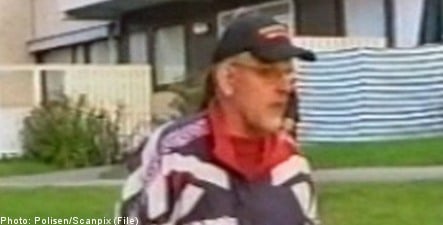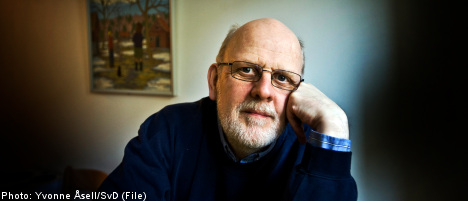His attorney Thomas Olsson claims the way in which his client’s case has been handled by the criminal justice system is“downright insulting”.
But prosecutors aren’t worried about an eventual reversal for Quick, who had previously confessed to committing more than 20 murders.
In documents accompanying the petition, Olsson details a number of mistakes he alleges took place in the police investigation of the murder of Yenon Levi, a 24-year-old Israeli was killed while visiting relatives in Sweden in 1988.
Quick was convicted of the killing by the Hedemora District Court in central Sweden in 1997.
“The conviction is based on a confession from a mentally ill and drugged person. In addition, relevant investigative material was withheld from the court,” Olsson said to the TT news agency
The petition includes the name of another possible culprit in Levi’s killing, as well as information from several witnesses connecting the alternative assailant, who is said to have strong anti-Semitic views, to Levi – who was Jewish – at the time of the murder.
Retrial requests are rarely granted in Sweden as the requirements are so high.
Those who seek a retrial need to present new circumstances or evidence which likely would have led to an acquittal had it been known previously.
“Everything leads to the conclusion that my client’s confession was fabricated. What the district court didn’t know was that he was drugged and in therapy, which I believe is the reason he confessed,” said Olsson.
Quick’s petition is supported by notes from his medical file at the hospital in Säter where he was being treated as well as expert opinion on the effects of narcotic medications which Quick was taking at the time he confessed.
In addition, the petition explains that Quick offered different and conflicting accounts during his 14 police interrogations about what exactly transpired on the lonely forest road in Rörshyttan in Dalarna in central Sweden where Levi’s body was found.
According to Olsson, none of the accounts, however, match with forensic evidence gathered at the scene.
“But in court, Quick wasn’t confronted about his conflicting statements, nor did the court examine things which refuted his version,” said Olsson, who is convinced that Quick didn’t commit a single murder.
Ohlsson alleges that head prosecutor Christer van der Kwast withheld relevant information from the Hedemora District Court.
He also claims that a police investigator provided faulty information when called to testify during the trial.
But van der Kwast, who handled every case against Quick, doesn’t think the convicted killer or his lawyer have any new evidence in their petition.
“I haven’t heard anything so far that gives me reason to believe that they will consider giving Quick a new trial,” van der Kwast told TT.
“This all seems like much ado about nothing. We haven’t withheld any material. These are long held and baseless claims.”
Van der Kwast added that he doesn’t think there were any problems with the investigation into Levi’s death.
“This criticism is worthless. I don’t see anything wrong with what I’ve done.”
Quick was convicted for eight murders which took place between 1978 and 1988 and is currently serving a life term in a psychiatric institution.
None of the convictions were ever appealed by defence attorneys or prosecutors.
As a result, the retrial request was filed with the appeals court.
Quick withdrew all of his confessions in a television documentary broadcast in December, saying he had only admitted to the murders because he craved attention and was heavily medicated by doctors.
There has been scepticism about his involvement in the killings for years, as his convictions were entirely based on his confessions and there were no witnesses nor technical evidence.
During therapy he underwent before his trials, Quick admitted to almost 30 murders committed in Sweden, Norway and Finland, often describing how he butchered his victims and in at least one case ate the body parts.
But in the documentary broadcast on Swedish public television he said: “I didn’t commit any of the murders I have been convicted of, and I didn’t commit any of the murders I have confessed to either.”
The documentary was based on Quick’s medical journals from the psychiatric institute where he underwent therapy and where he spoke of violence, murders and sexual abuse that he witnessed in his family and to which he was subjected.
“The court was for example never informed that his confessions were believed to be based on suppressed memories that resurfaced in therapy,” Olsson said.
“They were not told that the therapy he underwent was considered unscientific, and that he was heavily affected by benzodiazepines, which have extensive side effects on a person’s mental health,” Olsson said.



 Please whitelist us to continue reading.
Please whitelist us to continue reading.
Member comments